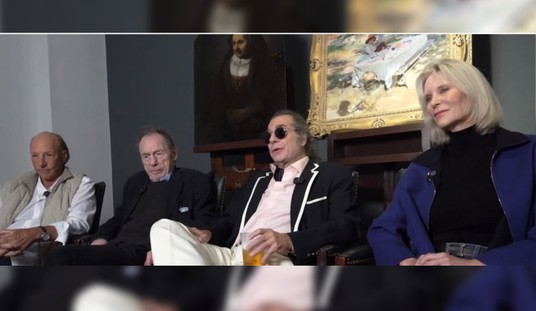“Herbert Marcuse’s Revenge” is charted by Theodore Dalrymple, who looks at the old Frankfurt School socialist crank who coined the Orwellian phrase “repressive tolerance.” We’ll get to the good Dr. Dalrymple’s column in just a moment, but to set the stage, it’s worth flashing back to how the rest of the Frankfurt School first washed ashore in America in the 1930s, via a passage from 2010 in the New York Times much beloved by the late Andrew Breitbart for its unintentional irony:
The Frankfurt School of philosophers emigrated from Nazi Germany and became dyspeptic critics of American culture. Several landed in Southern California where they were disturbed by the consumer culture and the gospel of relentless cheeriness. Depressive by nature, they focused on the disappointments and venality that surrounded them and how unnecessary it all was. It could be paradise, Theodor Adorno complained, but it was only California.
Yes, “only California,” where the movie industry had transplanted itself 20 years prior from the east coast of America — initially to escape Thomas Edison’s guild socialism, along with antisemitism in general — and where Hollywood and the rest of the state was poised to ride the postwar boom as America’s arbiter of fun, style, and freedom:
.
Naturally, for the Frankfort School, this would not do.
Take it away, Andrew Breitbart:
We always feel that our incredible traditions of freedom and liberty will convert those who show up on our shores, that they will appreciate the way of life we have created—isn’t that why they wanted to come here in the first place? We can’t imagine anyone coming here, experiencing the true wonder that is living in this country, and wanting to destroy that. But that’s exactly what the Frankfurt School wanted to do.
These were not happy people looking for a new lease on life. When they moved to California, they simply couldn’t deal with the change of scenery—there was cognitive dissonance. Horkheimer and Adorno and depressive allies like Bertolt Brecht moved into a house in Santa Monica on Twenty-sixth Street, coincidentally, the epicenter of my childhood. They had moved to heaven on earth from Nazi Germany and apparently could not handle the fun, the sun, and the roaring good times. Ingratitude is not strong enough a word to describe these hideous malcontents.
If only they had had IKEA furniture, this would have made for a fantastic season of The Real World.
Brecht and his ilk were the Kurt Cobains of their day: massively depressed, nihilistic people who wore full suits in eighty-degree weather while living in a house by the beach.
“Adorno was wrong. It was paradise. To the rest of the world, America’s vision was a vision of paradise. And these Marxists were here to try to destroy the best lifestyle man had ever created. If I could go back in a time machine, I would go back to kick these malcontents in their shins,” Andrew wrote in his 2011 book Righteous Indignation: Excuse Me While I Save the World.
By the 1960s, other than behind the Iron Curtain and their unofficial American outpost at the Frankfurt School, the whole world was California Dreamin’, to coin a phrase. “Young people in the U.S.—in the form of the Psychedelic or Flower Generation—were helping themselves to wild times that were the envy of children all over the world,” Tom Wolfe wrote in his 1976 essay, “The Intelligent Coed’s Guide To America,” reprinted in his Purple Decades anthology:
In short, freedom was in the air like a flock of birds. Just how fascist could it be? This problem led to perhaps the greatest Adjectival Catch Up of all times: Herbert Marcuse’s doctrine of “repressive tolerance.” Other countries had real repression? Well, we had the obverse, repressive tolerance. This was an insidious system through which the government granted meaningless personal freedoms in order to narcotize the pain of class repression, which only socialism could cure. Beautiful! Well-nigh flawless!
So how’s that “repressive tolerance” working out today? Well, it’s making everyone in America as miserable as Marcuse and the gang were, which might actually put the tiniest smiles on their faces, as they trundle along in their charcoal gray flannel suits down in Socialist Hell. Which brings us, at last, to Theodore Dalrymple’s column this weekend:
One of the reasons our society appears less tolerant than it ought to be, and why so many people are now afraid to speak their mind in so many situations, is that a spirit of puritanism of opinion is abroad. This puritanism is not puritanical in the old sense. On the contrary, it is inclined to attach itself to libertinism. But it wants to send to Coventry all those who think that the removal of restraints on conduct is not necessarily a good thing. It brands them as ipso facto bigots (as, of course, some but not all of them will be), and is prepared to punish them, so far as is possible, for holding the wrong opinions.
Thus are created what one might call microclimates of totalitarianism in which people live in fear: fear of losing their jobs, fear of social ostracism for having said or even thought the wrong thing.
This is a problem that is neither of the government’s making nor susceptible to solution by government. (Indeed, government action can only exacerbate it.) The problem lies in the human heart—in its lust for power and thirst for domination, in its pride in its own goodness.
Tolerance is a habit of the heart that is acquired by self-restraint and not merely through a set of political arrangements. If we are not tolerant of those with whom we disagree, we are not tolerant. After all, it takes no great tolerance to tolerate those who agree with us. Insofar as our societies remain tolerant, it is not because the people who compose it are tolerant. It is because they are not politically powerful enough to impose their views on everyone else.
The new puritans, viewing themselves as tolerant, would be prepared to repress the intolerant—by definition, those with whom they disagree. Thus does repressive tolerance come to have a real meaning in our time. As Herbert Marcuse’s favorite philosopher, Hegel, said: The owl of Minerva takes wing at dusk.
And thanks in large part to the Marcuse and the rest of the Frankfurt School, wintry nighttime is descending rapidly, where there had once been carefree California sun:
[jwplayer config=”pjmedia_eddriscoll” mediaid=”63004″ width=”590″ height=”360″]









Join the conversation as a VIP Member